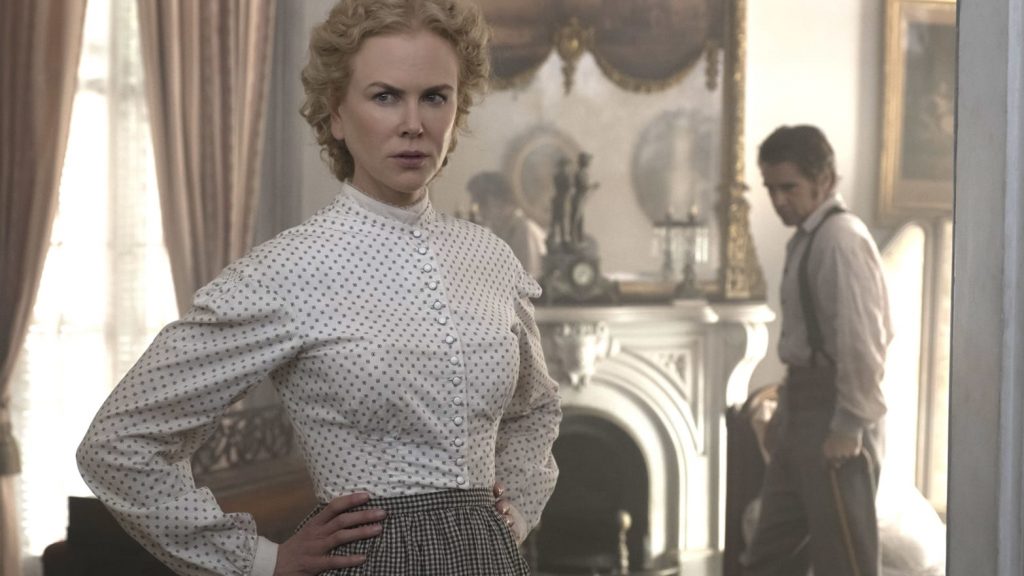When I saw Sofia Coppola’s latest film The Beguiled (2017) at the County Theater in Doylestown I was actually really surprised by it. I know it really wasn’t very much akin to its source material, A Painted Devil by Thomas P. Cullinan, and it certainly stood in sociological opposition to the Don Siegel adaptation of 1971. And yet, I found the film to be boring.
Coppola’s style appears to have opened up to prioritize geographical location and setting at a higher value since The Bling Ring (2013), often times reminding me of David Gordon Green’s more recent independent film dramas. But this sudden value she appears to have found in locale is overwhelmed by how cloistered the narrative scope is (a sharp contrast to her 2003 feature Lost In Translation). It is almost as if by adapting Cullinan’s novel into a film and reconstructing it as a feminist work that Coppola has repressed all of the other links to the political, sociological, and historical contexts that should have shaped the narrative and given it greater value.
The Beguiled, very early on, severs all of its ties with the American institution of slavery. If memory serves it is Nicole Kidman, as Miss Farnsworth, who observes that “about a year ago all of our slaves left”. Then later, Colin Farrell, as Corporal McBurney, relates to his hosts that he is a “mercenary”, and that he does not believe in either the Union nor the Confederate causes in one of the most blatant pieces of expositional dialogue I have heard in awhile. Both of these moments “whitewash” the narrative. Coppola denies her audience the context of these characters’ very existence in order to keep the viewer’s focus solely on the sexual politics of The Beguiled. In so doing, I hardly see the purpose of even keeping the narrative of The Beguiled situated during the American Civil War. These events could just as easily have happened if they were set in Bosnia, Iran, Chile, or Vietnam.

The Beguiled’s most glaring narrative omission is its inability to articulate the generational divide between the seminary’s instructors and their charges. That Sofia Coppola has proven quite adept at depicting the nuances of such conflicts in her features The Virgin Suicides (1999), Lost In Translation, and yet would rather not address these issues in The Beguiled is disappointing. A good deal about all of the leads could have been shown/learned by allowing the film the time to expand upon these interrelationships.
The sexual politics of The Beguiled (an eye for an eye so to speak) themselves, though superficially interesting, aren’t anything new. When walking out of the theater I thought about how much the narrative structure of The Beguiled reminded me of Andrea Arnold’s film Fish Tank (2009). Both films’ narrative structure begins and hinges upon the introduction of a male into a unit of women (a single mother and her two daughters in Fish Tank). In as much as for control as for a bid for power, these male characters (Farrell and Michael Fassbender) attach themselves openly to the older female characters while intending to sexually exploit the younger. But where in The Beguiled the unit of women combines to seek retribution for the male’s offenses, in Fish Tank, it is only the eldest daughter Mia (Katie Jarvis) who takes up the task (her mother and little sister prefer denial). By focusing only on Mia’s journey through the narrative Arnold gives her audience a strong portrait of womanhood in the early 21st century while also bypassing a broad allegorical form that the seminary represents in The Beguiled.
Andrea Arnold’s specificity of character, time and place as well as her employment of minor details in character and setting ground her realist narrative in a very contemporary setting, relying on the emotional vitality of the performers (Fassbender and Jarvis) to give the film enough “truth”, as Cassavetes would call it, to be transcendent. Sofia Coppola, on the other hand, appears to have designed her film to be “timeless” in terms dictated by its omissions as much as its inclusions. For me this makes Fish Tank a far more relevant and engaging piece of cinematic art than The Beguiled.
Sofia Coppola’s brand of cinematic feminism is then only existent in conditions similar to a vacuum. The trappings of moment and setting must be made superfluous to propagate any meaningful dialogue exchange with an audience regarding feminist discourse. This doesn’t mean that The Beguiled is a bad film. In many respects I believe there is something of value in what Coppola gives audiences with her film by simply sustaining such a discourse at all. The issue for me is that the film doesn’t live up to its own potential as a means for both strengthening and widening the discourse that concerns Sofia Coppola so much.
This review was first published in the Spring of 2017.
